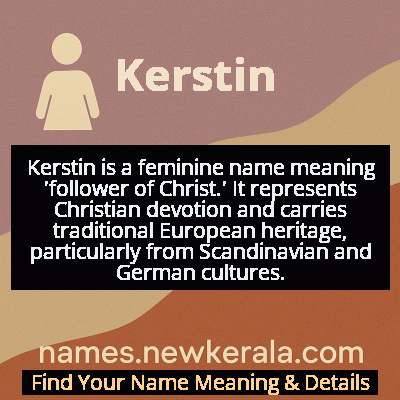Kerstin Name Meaning & Details
Origin, Popularity, Numerology Analysis & Name Meaning of Kerstin
Discover the origin, meaning, and cultural significance of the name KERSTIN. Delve into its historical roots and explore the lasting impact it has had on communities and traditions.
Name
Kerstin
Gender
Female
Origin
Unknown
Lucky Number
6
Meaning of the Name - Kerstin
Kerstin is a feminine name meaning 'follower of Christ.' It represents Christian devotion and carries traditional European heritage, particularly from Scandinavian and German cultures.
Kerstin - Complete Numerology Analysis
Your Numerology Number
Based on Pythagorean Numerology System
Ruling Planet
Venus
Positive Nature
Harmonious, responsible, caring, and artistic.
Negative Traits
Overly idealistic, superficial, possessive, or jealous.
Lucky Colours
Pink, turquoise.
Lucky Days
Friday.
Lucky Stones
Diamond, turquoise.
Harmony Numbers
2, 3, 9.
Best Suited Professions
Artists, musicians, teachers, healthcare workers.
What People Like About You
Warmth, nurturing nature, artistic flair.
Famous People Named Kerstin
Kerstin Ekman
Author
Renowned Swedish novelist and member of the Swedish Academy
Kerstin Gier
Author
Best-selling German author of the 'Ruby Red' trilogy
Kerstin Andreae
Politician
Vice President of the Federation of German Industries
Kerstin Hesselgren
Politician
First woman elected to Swedish Parliament in 1922
Name Variations & International Equivalents
Click on blue names to explore their detailed meanings. Gray names with will be available soon.
Cultural & Historical Significance
In Scandinavian societies, Kerstin represents a connection to traditional values while embodying strength and independence. The name's popularity in the 20th century coincided with women's increasing participation in public life, making it symbolic of both tradition and progressive change. Notable bearers like Kerstin Hesselgren, Sweden's first female MP, have reinforced the name's association with pioneering women who broke barriers in politics, literature, and social reform.
The name also reflects the cultural exchange between German and Scandinavian societies, particularly in northern Germany where Scandinavian influence has been historically strong. This cross-cultural dimension adds layers of meaning to the name, representing shared European heritage while maintaining distinct regional characteristics that make Kerstin uniquely positioned in the landscape of European names.
Extended Personality Analysis
Individuals named Kerstin are often perceived as strong-willed, intelligent, and deeply principled. They typically exhibit a blend of traditional values with modern independence, creating a personality that is both grounded and forward-thinking. Kerstins are known for their reliability and determination, often approaching challenges with methodical precision and unwavering commitment to their goals. Their strong sense of ethics guides their decisions, making them trustworthy individuals in both personal and professional settings.
Socially, Kerstins tend to be loyal friends and family members who value deep, meaningful connections over superficial relationships. They often possess strong intuitive abilities and emotional intelligence, making them excellent listeners and advisors. While they can appear reserved initially, once trust is established, they reveal warm, compassionate natures with a subtle sense of humor and keen observational skills that make them insightful companions. Their balanced approach to life allows them to navigate complex situations with grace and wisdom.
In professional environments, Kerstins often excel in roles requiring attention to detail, strategic thinking, and interpersonal skills. They are natural problem-solvers who combine practical intelligence with creative insight. Their leadership style tends to be collaborative rather than authoritarian, earning respect through competence and fairness rather than through assertiveness alone.
Modern Usage & Popularity
In contemporary naming practices, Kerstin maintains a presence as a classic, established name primarily in German-speaking regions and Scandinavia, though its popularity has significantly declined from its mid-20th century peak. The name is now considered traditional rather than fashionable, often chosen by parents seeking a name with strong cultural heritage and timeless quality. In Germany, it continues to appear with moderate frequency, particularly in regions with historical Scandinavian connections, while in Sweden it's more commonly found among middle-aged and older women but still occasionally given to newborns. The name's international recognition has been bolstered by prominent figures in literature, politics, and academia, giving it cross-cultural appeal while preserving its distinct European character. Current usage trends show it as a choice for parents valuing substance over trendiness, with a slight resurgence among those rediscovering traditional names with meaningful histories.
Symbolic & Spiritual Meanings
Symbolically, Kerstin represents the harmonious integration of spiritual devotion and worldly capability, embodying the concept of living one's faith through practical action and moral integrity. The name carries profound connotations of resilience and steadfastness, suggesting an individual who remains anchored in their values while navigating life's complexities. It symbolizes the bridge between heritage and progress, reflecting the modern individual who respects tradition without being constrained by it. The name also evokes qualities of quiet strength and understated elegance, representing power that manifests through consistency, wisdom, and inner conviction rather than outward display. In metaphorical terms, Kerstin suggests a deep-rooted tree - firmly planted in rich soil of tradition yet reaching upward toward new possibilities, offering shelter and stability while continuing to grow and adapt through changing seasons.

